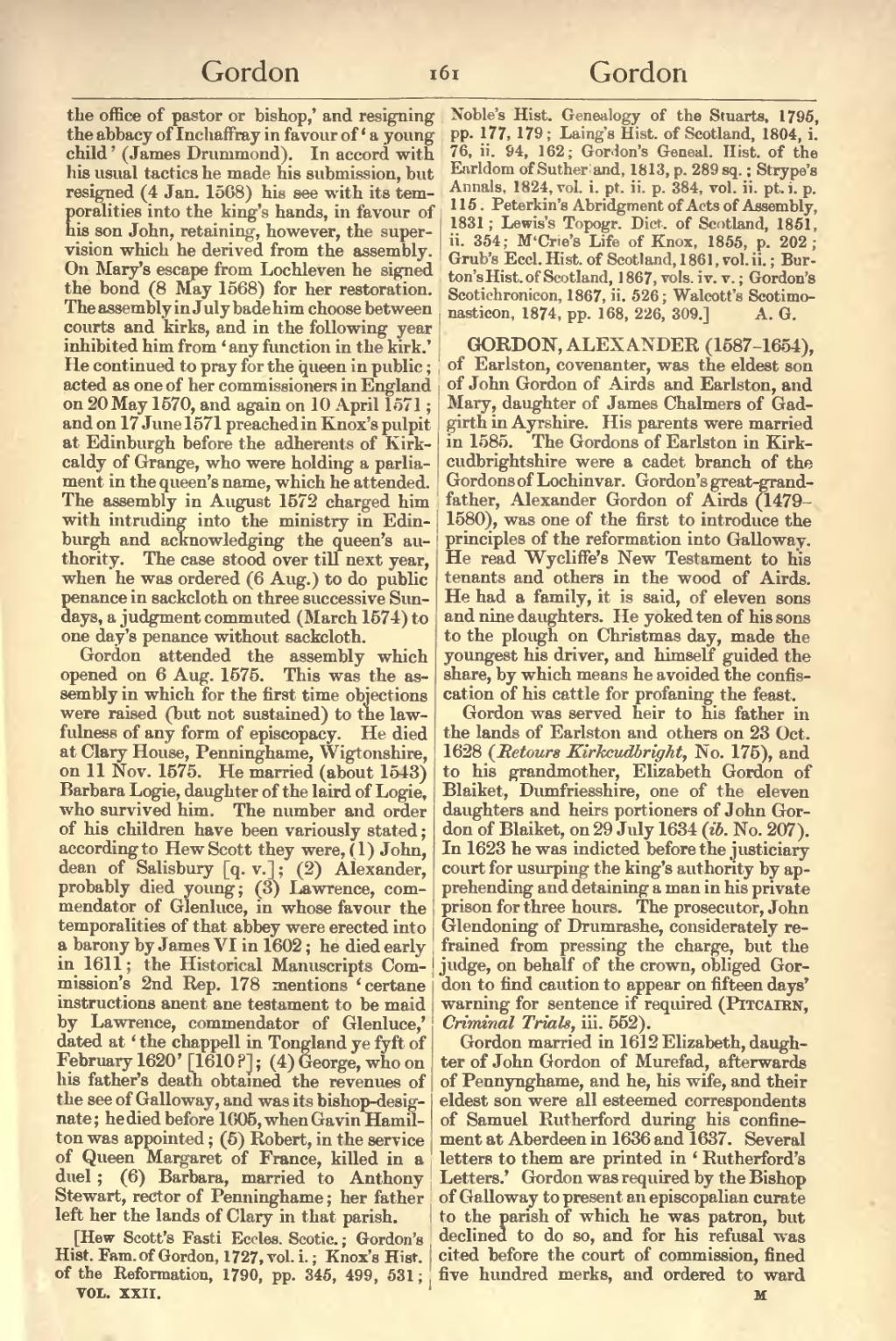the office of pastor or bishop,’ and resigning the abbacy of Inchaffray in favour of ‘a young child’ (James Drummond). In accord with his usual tactics he made his submission, but resigned (4 Jan. 1508) his see with its temporalities into the king's hands, in favour of his son John, retaining, however, the supervision which he derived from the assembly. On Mary's escape from Lochleven he signed the bond (8 May 1568) for her restoration. The assembly in July bade him choose between courts and Kirks, and in the following year inhibited him from ‘any function in the kirk.’ He continued to pray for the queen in public; acted as one of her commissioners in England on 20 May 1570, and again on 10 April 1571; and on 17 June 1571 preached in Knox's pulpit at Edinburgh before the adherents of Kirkcaldy of Grange, who were holding a parliament in the queen's name, which he attended. The assembly in August 1572 charged him with intruding into the ministry in Edinburgh and acknowledging the queen's authority. The case stood over till next year, when he was ordered (6 Aug.) to do public penance in sackcloth on three successive Sundays, a judgment commuted (March 1574) to one day's penance without sackcloth.
Gordon attended the assembly which opened on 6 Aug. 1575. This was the assembly in which for the first time objections were raised (but not sustained) to the lawfulness of any form of episcopacy. He died at Clary House, Penninghame, Wigtonshire, on 11 Nov. 1575. He married (about 1543) Barbara Logie, daughter of the laird of Logie, who survived him. The number and order of his children have been variously stated; according to Hew Scott they were, (1) John, dean of Salisbury [q. v.]; (2) Alexander, probably died young; (3) Lawrence, commendator of Glenluce, in whose favour the temporalities of that abbey were erected into a barony by James VI in 1602; he died early in 1611; the Historical Manuscripts Commission's 2nd Rep. 178 mentions ‘certane instructions anent ane testament to be maid by Lawrence, commendator of Glenluce,’ dated at ‘the chappell in Tongland ye fyft of February 1620’ [1610?]; (4) George, who on his father's death obtained the revenues of the see of Galloway, and was its bishop-designate; he died before 1605, when Gavin Hamilton was appointed; (5) Robert, in the service Queen Margaret of France, killed in a a duel; (6) Barbara, married to Anthony Stewart, rector of Penninghame; her father left her the lands of Clary in that parish.
[Hew Scott's Fasti Eccles. Scotic.; Gordon's Hist. Fam. of Gordon, 1727, vol. i.; Knox's Hist. of the Reformation, 1790, pp. 345, 499, 531; Noble's Hist. Genealogy of the Stuarts, 1795, pp. 177, 179; Laing's Hist. of Scotland, 1804, i. 76, ii. 94, 162; Gordon's Geneal. Hist. of the Earldom of Sutherland, 1813, p. 289 sq.; Strype's Annals, 1824, vol. i. pt. ii. p. 384, vol. ii. pt. i. p. 115, Peterkin's Abridgment of Acts of Assembly, 1831; Lewis's Topogr. Dict. of Scotland, 1851, ii. 354; M'Crie's Life of Knox, 1855, p. 202; Grub's Eccl. Hist. of Scotland, 1861, vol. ii.; Burton's Hist. of Scotland, 1867, vols. iv. v.; Gordon's Scotichronicon, 1867, ii. 526; Walcott's Scotimonasticon, 1874, pp. 168, 226, 309.]
GORDON, ALEXANDER (1587–1654), of Earlston, covenanter, was the eldest son of John Gordon of Airds and Earlston, and Mary, daughter of James Chalmers of Gadgirth in Ayrshire. His parents were married in 1585. The Gordons of Earlston in Kirkcudbrightshire were a cadet branch of the Gordons of Lochinvar. Gordon's great-grandfather, Alexander Gordon of Airds (1479-1580), was one of the first to introduce the principles of the reformation into Galloway. He read Wycliffe's New Testament to his tenants and others in the wood of Airds. He had a family, it is said, of eleven sons and nine daughters. He yoked ten of his sons to the plough on Christmas day, made the youngest his driver, and himself guided the share, by which means he avoided the confiscation of his cattle for profaning the feast.
Gordon was served heir to his father in the lands of Earlston and others on 23 Oct. 1628 (Retours Kirkcudbright, No. 175), and to his grandmother, Elizabeth Gordon of Blaiket, Dumfriesshire, one of the eleven daughters and heirs portioners of John Gordon of Blaiket, on 29 July 1634 (ib. No. 207). In 1623 he was indicted before the justiciary court for usurping the king's authority by apprehending and detaining a man in his private prison for three hours. The prosecutor, John Glendoning of Drumrashe, considerately refrained from pressing the charge, but the judge, on behalf of the crown, obliged Gordon to find caution to appear on fifteen days' warning for sentence if required (Pitcairn, Criminal Trials, iii. 552).
Gordon married in 1612 Elizabeth, daughter of John Gordon of Murefad, afterwards of Pennynghame, and he, his wife, and their eldest son were all esteemed correspondents of Samuel Rutherford during his confinement at Aberdeen in 1636 and 1637. Several letters to them are printed in ‘Rutherford's Letters.’ Gordon was required by the Bishop of Galloway to present an episcopalian curate to the parish of which he was patron, but declined to do so, and for his refusal was cited before the court of commission, fined five hundred merks, and ordered to ward
